This narrative of the world history of Eucharistic Adoration
does not start at some time in the middle ages or even with the early Christian
Church.We are going to start at the beginning.
This Prologue is concerned with declaring Jesus Christ is
God and always was God. Jesus Christi is the Word of God so Jesus Christ is
God. The First Commandment is to adore God and only God. Jesus is God. We are
to adore Jesus as God.
In Sacred Scripture, a literary device called an “inclusion”
is often used where a specific idea is brought up at the beginning of a block
of text and at the end so as to make the idea become a theme of the text. In the Gospel of John, the verse 1:1 words
“the Word was God” is an inclusion with John 20:28 where Thomas calls Jesus “my
God” thus wrapping the Divinity of Jesus as a theme around the entire Gospel of
John. In addition, the words “and the
Word was” in verse 1:1 is akin to the “I Am” verses in the New Testament where
Jesus in effect declares Himself God by tying himself to the name “I Am,” which
God gave Himself at the burning bush as Moses’ request.
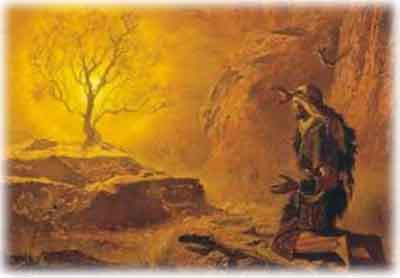
In the Old Testament, God revealed Himself to Moses in the
burning bush and because God was present there the ground was Holy Ground. When Moses asked God His name God replied “I
Am. ”We often hear God referred to as “Yahweh”
which comes from “I Am.”Being in the
presence of God is being on Holy Ground. When Moses went up to Mount Sinai once again in Exodus 24:15-16 a cloud
covered the mountain and “the glory of God” settled there. Later when the “Tabernacle of the tent of
meeting” was erected within which the Ark of the Covenant was placed, “the
glory of God” settled there and “the glory of God” filled it. (Ex 40:34). The
same thing happened when Solomon’s Temple was dedicated.
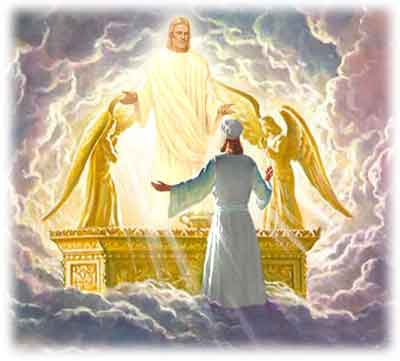
The Ark of the Covenant contained three types of Jesus
Christ.The Ark contained the shattered
tablets of the Ten Commandments i.e., the “Word” of God. Aaron's rod that budded was a sign of Jesus
the Eternal High Priest. Finally, the Ark contained some of the Manna from
Heaven which fed the Israelites on their journey to the Promised Land and this
Manna prefigures the Holy Eucharist. When
the Ark of the Covenant was contained in the Holy of Holies God’s presence
would overshadow it. Israel is told to make a dwelling place (tent i.e.
tabernacle) for God in the Ark of the Covenant so God could dwell among his
people. Also of note is the Temple Showbread which was the bread of the
tabernacle which God declared in Exodus 25 as the “bread of the Presence” that
was to be in the tabernacle at all time. The tabernacle becomes the site of
God’s localized presence among His people. God is adored in His physical presence in the tabernacle and Sacred
Scripture gives promises that in days to come this “tabernacle,” this “dwelling”
of God will become more impressive.
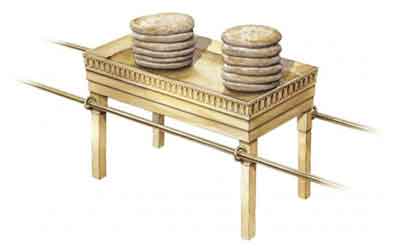
“You will know that I am the Lord your who makes his
dwelling in Zion.” Joel 3:17
“Sing and rejoice O daughter of Zion, for look, I come and
will make your dwelling in your midst.” Zech 2:10
“My name shall dwell in the house of Israel forever.”
Ezekiel 43:7
This “dwelling” is the same Greek word so in all cases we
are being told of a physical dwelling of God in our midst. But we have a
problem. In the ancient Hebrew religion,
this tabernacle dwelling took place in a specific place and with the
destruction of the Jerusalem by the Romans in 70 A.D. and more specifically
with the destruction of the Holy Temple, the Passover Sacrifice ended the
tabernacle dwelling of God ceased. Modern
Jewish synagogues have symbolic tabernacle representing what once was but is
acknowledged to no longer be. The “Glory
of God” no longer “dwells” in the modern Jewish “tabernacle.” Yet God promised
this would go on forever. Moreover, in Malachi he prophesied it would go on all
over the world.
Up to verse Malachi 1:10 there is no doubt the people of the
time would have understood everything God is pointing out to be related to the sacrificial
offerings of the temple. The priests and
the people are lacking in respect for God in the rituals they are to carry out
and God is not pleased with this situation. Further evidence will be presented in verses 1:12 – 2:9 but a specific
prophecy is given to the people in verse 1:11 and this exegesis will now
concentrate on this prophetic verse.
The Mal 1:11 prophecy tells of a time when in every nation
pure offerings will be accepted by God. The
verse’s starting phrase “For from the rising of the sun to its setting” is also
found in Ps 50:1; Ps 113:3; Is 45:6; and Is 59:19. These verses look towards a
future display of the God’s greatness and power to the whole world. Some scholars say the entire Mal 1:11 text
should be removed because its universality does not seem to flow with the local
issue of temple sacrifice[i]
but this opinion ignores, rejects, or is unaware of the official Catholic
interpretation which points this verse to the Holy Sacrifice Mass. The Council
of Trent, in response to the Protestant Revolution and the rejection of the
Mass officially interprets Mal 1:11 as being the prophecy that is fulfilled by
the Catholic Mass. According to Is 66:21,
the new sacrifice, or “pure offering” will be carried out by a priesthood not
solely Jewish[ii].
Malachi 1:11 is fulfilled in the Sacrifice of the Mass. It is an unbloody
food offering. It is universal in regard
to place and time and its incorporation of the gentiles. It uses a delegated priesthood differing from
that of the Jews, with Christ as the High Priest and Victim. The Council of Trent calls it a “pure
oblation, which cannot be defiled by unworthiness and impiety on the part of
those who offer it, and concerning which God has predicted through Malachi,
that there would be offered up a clean oblation in every place to His Name,
which would be great among the Gentiles.”
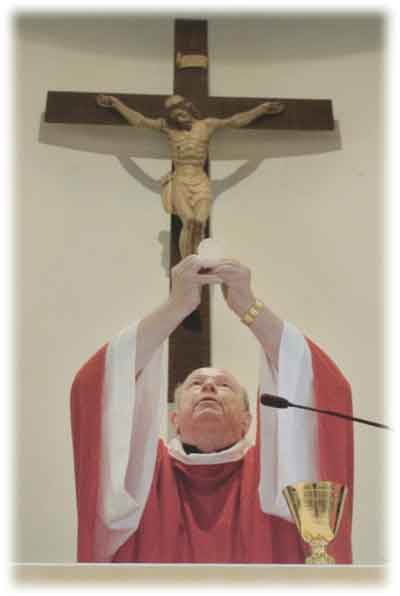
And so around the world from the rising of the sun until its
setting the pure offering of our Lord Jesus Christ is being offered without
blemish, free from the errors Malachi condemned because Christ Himself is both
our pure sacrifice and our sinless priest, the showbread fulfilled, the manna
from heaven fulfilled, the Passover Lamb fulfilled; and Mal 1:11 fulfilled as our
spiritual food-offering that will give us eternal life. To paraphrase Mal 1:5, my own eyes have seen
this and I say “Great is the Lord, beyond the border of Israel!” Hallelujah!
And the Word became flesh and dwelt among us. The Word was God and the Word became flesh and dwelt among us. The Word is the Divine Being destined to talk to man and He becomes flesh in the Incarnation to do just that. Jesus is both God and man. Jesus is the new dwelling place of God among men. In Revelation 7:15 the same Greek work for “Dwelling” which echoes the prophets “He will dwell with them and they shall be His people.” Also, the Greek for “dwell” represent the Hebrew word for “dwell.” The incarnation replaces the Old Testament tabernacle.
Malachi 1:11 is made clearer in the Gospels with the Last Supper Institution of the Most Holy Eucharist in Matthew, Mark, and Luke as well as in 1 Corinthians 11 but most specifically in the Gospel of John Chapter 6 where Jesus declares his Flesh is “indeed” true food and His Blood true drink and that we must eat His Flesh and drink His Blood. John the Baptist declares Jesus the true Passover Lamb of God which, remember, will not only be killed but will be eaten. At the Last Supper Christ established the Holy Mass, the Holy Priesthood, and the Holy Eucharist.
When Christ died the curtain was torn in two and the Holy of Holies became open to everyone. Current Jewish synogogues still have a Holy of Holies shrine but only as an imperfect reminder that they have lost this presence of God. During the Passover meal Jews have a lamb shankbone on the table but they do not eat the Passover Lamb because they can no longer do sacrifice since the temple was destroyed in 70AD. And yet the prophecy of Exodus 11 that this eating of the Passover Lamb will go on forever must be fulfilled. In the Catholic Church, we have the perfect fulfillment of the Holy of Holies in the tabernacle where instead of the three mere types of Jesus we have the Body, Blood, Soul and Divinity of Jesus. We eat the true Sacrificial Lamb, Jesus Christ in the Holy Eucharist.
In 1 Cor 11 Paul explains that profaning the Eucharistic is profaning Jesus Himself. Paul speaks of “discerning” what today we call the “Real Presence” of Jesus. So biblically the Catholic Church teaches the Eucharist is Jesus Himself who is God Himself who is worthy of Adoration, our Eucharistic Adoration. Who can doubt that our Blessed Mother, while still on this earth, did not love and adore her Son in the Blessed Sacrament?
We must always remember that the Catholic Church is the Kingdom of God and Jesus likened the Kingdom of God to a mustard seed. The sapling Church of course would not stay in such a state. It would grow and as it grows it matures. As the Church matured throughout the ages, so did Eucharistic Adoration.
The Early Church we have numerous examples teaching of the Real Presence. We have in ancient Rome during the third century persecutions the example of the youth St Tarcisius gives up his life protecting the Eucharist (which he was bringing to Christians in prison) from a band of pagan youths who Tarcisius feared would defile his God Jesus, whom he carried in the Eucharist. The Fathers of the Church in these early centuries taught the Real Presence as God in the Eucharist.
Ignatius of Antioch (110 A.D.):
"I have no taste for corruptible food nor for the pleasures of this life. I desire the bread of God, which is the flesh of Jesus Christ, who was of the seed of David; and for drink I desire his blood, which is love incorruptible"
"Take note of those who hold heterodox opinions on the grace of Jesus Christ which has come to us, and see how contrary their opinions are to the mind of God. . . . They abstain from the Eucharist and from prayer because they do not confess that the Eucharist is the flesh of our Savior Jesus Christ, flesh which suffered for our sins and which that Father, in his goodness, raised up again. They who deny the gift of God are perishing in their disputes."
Justin Martyr (151 A.D.):
"We call this food Eucharist, and no one else is permitted to partake of it, except one who believes our teaching to be true and who has been washed in the washing which is for the remission of sins and for regeneration [i.e., has received baptism] and is thereby living as Christ enjoined. For not as common bread nor common drink do we receive these; but since Jesus Christ our Savior was made incarnate by the word of God and had both flesh and blood for our salvation, so too, as we have been taught, the food which has been made into the Eucharist by the Eucharistic prayer set down by him, and by the change of which our blood and flesh is nurtured, is both the flesh and the blood of that incarnated Jesus."
Origen (244 A.D.):
"I wish to admonish you with examples from your religion. You are accustomed to take part in the divine mysteries, so you know how, when you have received the Body of the Lord, you reverently exercise every care lest a particle of it fall and lest anything of the consecrated gift perish. You account yourselves guilty, and rightly do you so believe, if any of it be lost through negligence.”.
St. Ambrose (390 A.D.): “You say, perhaps, this bread is no other than what is used for common food.’ True, before consecration it is bread; but no sooner are the words of consecration pronounced than from bread it becomes the flesh of Christ. . . Although the species of bread and wine are visible, yet we must believe that after consecration, the body and blood of Christ are alone there.”
Belief in the Real Presence was not even seriously contested until the eleventh century by Berengarius of Tours. Even so early Church Councils wrote of the Real Presence in order to make points about other matters but the by-product is tangible proof of belief in the early centuries.
Council of Nicaea (325 A.D.): "It has come to the knowledge of the holy and great synod that, in some districts and cities, the deacons administer the Eucharist to the presbyters [i.e., priests], whereas neither canon nor custom permits that they who have no right to offer [the Eucharistic sacrifice] should give the Body of Christ to them that do offer [it].”
Council of Ephesus (431 A.D.): "We will necessarily add this also. Proclaiming the death, according to the flesh, of the only-begotten Son of God, that is Jesus Christ, confessing his resurrection from the dead, and his ascension into heaven, we offer the unbloody sacrifice in the churches, and so go on to the mystical thanksgivings, and are sanctified, having received his holy flesh and the precious blood of Christ the Savior of us all. And not as common flesh do we receive it; God forbid: nor as of a man sanctified and associated with the Word according to the unity of worth, or as having a divine indwelling, but as truly the life-giving and very flesh of the Word himself. For he is the life according to his nature as God, and when he became united to his flesh, he made it also to be life-giving.”
In response to Berengarius however, the Catholic Church during the Fourth Lateran Council declared that transubstantiation must be believed. Transubstantiation, simply put means the bread and wine, after the Consecration, are no longer bread and wine but rather the Body, Blood, Soul, and Divinity of Jesus Christ with only the appearances of bread and wine remaining. Denials of the Real Presence became rampant during the Protestant Revolution such that for all intents and purposes no Protestant sect believes in the Real Presence. If you think about it this is a way of God showing His mercy because without a valid Priesthood there is no Real Presence and if someone believed a mere piece of stale bread and wine was God that would be incredible idolatry. But since the Protestant revolutionaries were denying the Real Presence in the Catholic Mass the Council of Trent more clearly defined the Real Presence as well.
The following quote is from the Catechism of the Council of Trent:
“When our Lord says: This is my body, this is my blood, no person of sound mind can mistake His meaning, particularly since there is reference to Christ's human nature, the reality of which the Catholic faith permits no one to doubt. The admirable words of St. Hilary, a man not less eminent for piety than learning, are apt here: When our Lord himself declares, as our faith teaches us, that His flesh is food indeed, what room can remain for doubt concerning the real presence of His body and blood?”
As the centuries went by belief in the Real Presence and adoration of the Eucharistic of God grew by way of various practices very often due the work of Popes and saints.
Feast of Corpus Christi
St. Juliana of Mont Cornillion was a nun and mystic who in the early 1200’s was instructed by Our Lord to establish a feast of the Holy Eucharist and her bishop, the future Pope Urban IV, established the feast of Corpus Christi and celebrated it for the first time in 1264 A.D.
40 Hours Devotions
In 1537 A.D. the practice of “40 Hours Devotion” began to coalesce with the Blessed Sacrament being exposed in one Church after another for Eucharistic Adoration. Pope Paul III’s reply regarding requested indulgences for this practice is most notable:
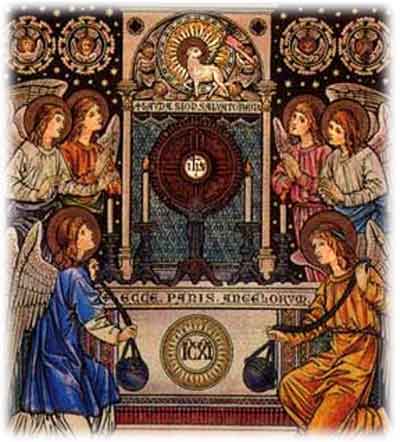
"Since [says the pontiff] . . . Our beloved son the Vicar General of the Archbishop of Milan at the prayer of the inhabitants of the said city, in order to appease the anger of God provoked by the offences of Christians, and in order to bring to naught the efforts and machinations of the Turks who are pressing forward to the destruction of Christendom, amongst other pious practices, has established a round of prayers and supplications to be offered both by day and night by all the faithful of Christ, before our Lord's Most Sacred Body, in all the churches of the said city, in such a manner that these prayers and supplications are made by the faithful themselves relieving each other in relays for forty hours continuously in each church in succession, according to the order determined by the Vicar . . . We, approving in our Lord so pious an institution, and confirming the same by Our authority, grant and remit"
To this very day the Catholic Church grants plenary indulgences, as often as daily, for merely one-half hour spent in Eucharistic Adoration.
Sacred Heart Devotions and Perpetual Adoration
The devotion to the Sacred Heart, as revealed by Jesus in various private revelations and as taught by numerous saints, most notably St Margaret Mary in the late 1600’s, emphasized Eucharistic Adoration as a most key part of this devotion. Also in the 1600’s we have the “Book of Perpetual Adoration; or the Love of Jesus in the Most Holy Sacrament” written by Henri Marie Boudin who is credited with growing Perpetual Eucharist Adoration in France.
Our Lady of Fatima and the Angel of Peace
The child visionaries of Our Lady of Fatima were first visited by the Angel of Peace who taught them Eucharistic Adoration not only by the beautiful prayers but by personal example and the angel bowed prostrate before the Blessed Sacrament with the children while the Host and Chalice were suspended in mid-air.
Divine Mercy
St Faustina and the Divine Mercy private revelations emanate from Eucharistic Adoration.
Pope Paul VI
Like most every Catholic Council, Vatican II has been followed by much confusion. During the time of Pope Paul VI there was so much error going on regarding the doctrine of the Real Presence that he wrote his Encyclical Letter Mysterium Fidei (Mystery of Faith) to correct errors regarding the “ineffable gift of the Eucharist” which “the Catholic Church has always guarded as a most precious treasure.” He stated that, contrary to what was being taught by some, “the Fathers of the [Vatican II] Council, confirming the doctrine which the Church has always held and taught and which was solemnly defined by the Council of Trent.” He expressed “serious pastoral concern and anxiety . . . for some who with reference either to Masses . . . or the dogma of Transubstantiation, or to devotion to the Eucharist, spread abroad opinions which disturb the faithful … and weaken the general meaning . . . of the concepts involved. . . and the spread of these and similar opinions does great harm to the faith and devotion to the Divine Eucharist.”
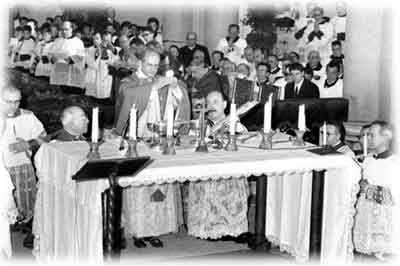
Pope Paul encouraged “a flourishing of Eucharistic piety” and speaks of and encourages “reserving Consecrated Hosts with the utmost care, exposing them to solemn veneration, and carrying them processionally to the joy of the great crowds of the faithful. He refers to “ancient documents” referring of this devotion and specifically refers to Origen (185 – 254 A.D.). He exhorts Catholics to “tirelessly promote the cult of the Eucharist, the focus where all other forms of piety must ultimately emerge.” He admonishes that “in the course of the day the faithful should not omit to visit the Blessed Sacrament.”
Pope Paul VI made clear Eucharistic Adoration is the most important devotion outside of the Holy Sacrifice of the Mass.
St John Paul II
With St John Paul II we come to our own age and there are so many examples of his personal devotion to Eucharistic Adoration that we will suffice with this one quote from the 45th International Eucharistic Congress in Seville, Spain, 1993:
“I hope that ... perpetual adoration, with permanent exposition of the Blessed Sacrament, will continue into the future. Specifically, I hope that the fruit of this Congress results in the establishment of perpetual Eucharistic Adoration in all parishes and Christian communities throughout the world.”
A result of this call for Perpetual Eucharistic Adoration in every parish in the world, a great growth in Eucharistic Adoration began bringing us to our own time.
Does YOUR parish have Perpetual Eucharistic Adoration? Regardless of the answer prayerfully consider asking Jesus if He wants you to spend more time with Him in the Blessed Sacrament and if He wants you to help grow Eucharistic Adoration. And, if today you hear His voice, harden not your hearts.